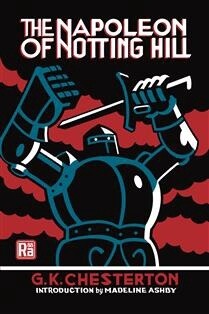The Napoleon of Notting Hill by G.K. Chesterton
A satire set in a future England, in which a neomedievalist contest among London neighborhoods takes a disastrous turn.
When Auberon Quin, a prankster nostalgic for Merrie Olde England, becomes king of that country in 1984, he mandates that each of London’s neighborhoods become an independent state, complete with unique local costumes. Everyone goes along with the conceit until young Adam Wayne, a born military tactician, takes the game too seriously . . . and becomes the Napoleon of Notting Hill. War ensues throughout the city—fought with sword and halberd!
G. K. Chesterton (1874–1936) was an English author, poet, critic, and newspaper columnist known for his brilliant, epigrammatic paradoxes. His best-known character is the priest-detective Father Brown, featured in over fifty stories published between 1910 and 1936, who solves mysteries and crimes thanks to his understanding of spiritual and philosophic truths; and his best-known novel is The Man Who Was Thursday (1908), a metaphysical thriller. In addition to The Napoleon of Notting Hill, his first novel, he wrote several other near-future satires of England.
Story Locale: Alternative-history England
Series Overview: Under the direction of Joshua Glenn, the MIT Press’s Radium Age is reissuing notable proto-science fiction stories from the underappreciated era between 1900 and 1935. In these forgotten classics, science fiction readers will discover the origins of enduring tropes like robots (berserk or benevolent), tyrannical supermen, dystopian wastelands, sinister telepaths, and eco-catastrophes. With new contributions by historians, science journalists, and science fiction authors, the Radium Age book series will recontextualize the breakthroughs and biases of these proto-science fiction classics, and chart the emergence of a burgeoning genre.
G. K. Chesterton (1874–1936) was an English author, poet, critic, and newspaper columnist known for his brilliant, epigrammatic paradoxes. His best-known character is the priest-detective Father Brown, featured in over fifty stories published between 1910 and 1936, who solves mysteries and crimes thanks to his understanding of spiritual and philosophic truths; and his best-known novel is The Man Who Was Thursday (1908), a metaphysical thriller. In addition to The Napoleon of Notting Hill, his first novel, he wrote several other near-future satires of England.
Madeline Ashby is the author of the Machine Dynasty series and the novel Company Town, as well as a contributor to How to Future: Leading and Sense-Making in an Age of Hyperchange. She has developed science fiction prototypes for Changeist, the Institute for the Future, the Smithsonian Institution, SciFutures, Nesta, the World Health Organization, the World Bank, the Atlantic Council, and others.
Author Residence: deceased
Author Hometown: London, England
